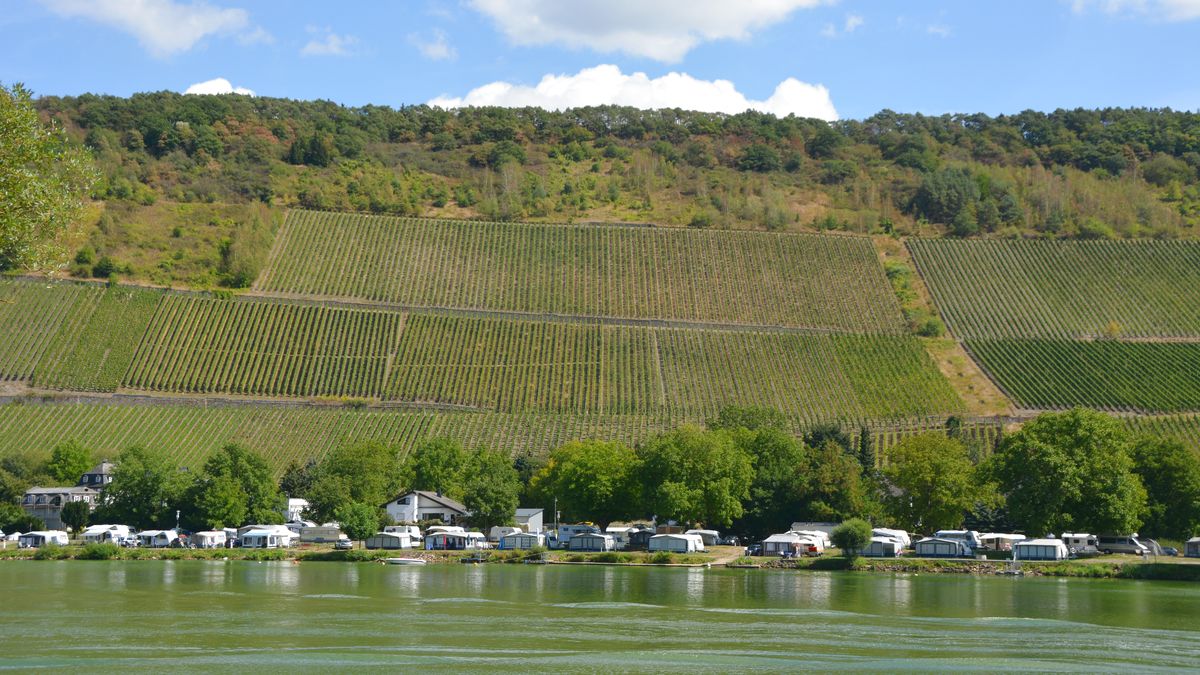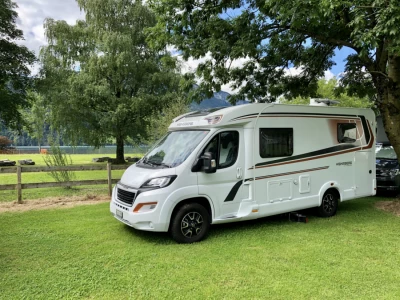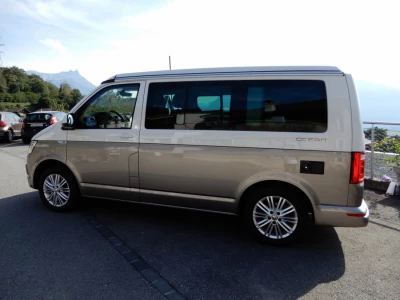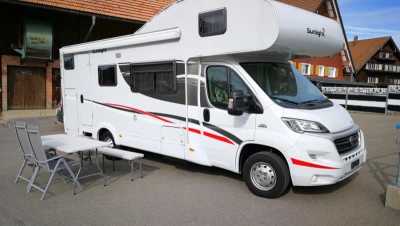Traveling to Germany with a motorhome or caravan

Germany is a fantastic country to visit with a motorhome or caravan. You can experience beautiful nature and picturesque towns, and there are plenty of both campsites and caravan parks. In addition, Germany offers many great holiday routes. Here you will find information about everything you need to know before your trip.
Take the motorhome or caravan to Germany?
Taking the motorhome or caravan from the Nordic countries to Germany is relatively easy. Germany is reasonably close and there are many routes and ferries to choose from. Traveling around Germany with a camping vehicle is also easy. Germans like to camp themselves and there are plenty of places where you can spend the night with your motorhome or caravan. At the same time, of course, there are a few things that are good to think about before you set off.
Entry rules in Germany
To enter Germany, you need a valid travel document, in the form of a passport, national ID card or provisional passport. Please note that during pandemic times, proof of covid and/or a negative covid test may also be required, and that the rules may vary depending on where you are traveling from and which federal state you plan to visit. You will find current information about the pandemic and travel to Germany at Germany travel.
Security and insurance
As a traveler, it is always important to keep abreast of the security situation and current events in the country you plan to visit. You can find up-to-date information via the Embassy’s travel information about Germany.
Before you go abroad, it is also wise to review your insurance policies. Check both your own travel insurance (home insurance) and the motorhome’s insurance. When you rent a motorhome via MyCamper, you must also check that you are allowed to bring the rented motorhome to Germany. You can find this information in the advertisement under “Rules”.
How do you get to Germany with a motorhome or caravan?
Germany is in a good location for us in the Nordics, but which route is best to take depends on where you live, but maybe also on prices, what you want to see along the way and what parts of Germany you plan to visit.
To Germany from Sweden
You who travel from Sweden can choose between several different ferry lines, which go directly from Sweden to Germany. You can travel from Gothenburg and several different locations in Skåne. Another option is to get to Denmark, via the Öresund Bridge or ferry, and from there continue to Germany. From Denmark you can take the ferry, or continue all the way to Jutland and drive south.
To Germany from Norway
You who travel from Norway can take a ferry to Denmark, for example from Kristiansand to Hirtshals. From here you can drive all the way to Germany. Alternatively, if you want to visit Själland, you can take a ferry from Rödby or Gedser to Germany. Another option is to drive to Sweden and from there take a ferry to Germany, via Gothenburg or Skåne.
To Germany from Finland
Those traveling from Finland can choose to take a ferry directly from Helsinki to Travemünde in Germany. Another option is to take a ferry to Sweden, for example from Helsinki to Stockholm, and drive south through the country to continue the journey by ferry from Skåne. Another option is to travel to Tallinn and drive south through Estonia, Latvia and Lithuania, and then west through Poland.

Ferries to Germany
If you want to take a ferry from the Nordics to Germany, there are several different routes and shipping companies to choose from. It is always good to bring a motorhome or caravan, even if you have to expect to pay extra for a larger vehicle or equipment. Also keep in mind that you may need to turn off the LPG on board the ferry.
How much does it cost to go by ferry to Germany?
The price of ferry trips to Germany varies depending on the route, shipping company, season and selected departure. The price is also affected by the vehicle you travel with. When you make your booking, you can fill in whether you are traveling with a motorhome or caravan and the length of the vehicle or trailer, and then you can see which price applies to your particular trip.
Note that it may be worth keeping an eye out for offers. Several shipping companies periodically run campaigns, and sometimes the campaigns are specifically aimed at people traveling with a motorhome or caravan.
How long does it take to go by ferry to Germany?
If you take a ferry from Skåne in southern Sweden to Germany, you can usually expect the crossing to take between six and eight hours. The trip with the shipping company FRS between Ystad and Sassnitz is an exception. As this shipping company operates the line with a fast ferry, the journey takes less than 2.5 hours.
If you instead travel from Gothenburg, the journey takes just over 15 hours and from Nynäshamn 18 hours. From Denmark, the trips take only 45 minutes (from Rödby) or two hours (from Gedser). From Helsinki, the journey takes over a day.

Ferry lines from Sweden to Germany
- Gothenborg – Kiel (Stena Line)
- Trelleborg – Rostock (Stena Line, TT-Line)
- Trelleborg – Travemünde (TT-Line)
- Malmö – Travemünde (Finnlines)
- Ystad – Sassnitz (FRS)
- Nynäshamn – Visby – Rostock (Hansa Destination)
Ferry lines from Finland to Germany
- Helsingfors – Travemünde (Finnlines)
Ferry lines from Denmark to Germany
- Gedser – Rostock (Scandlines)
- Rödby – Puttgarden (Scandlines)

Shopping in BorderShop in Germany
In the German ferry ports, you are often met by a so-called “BorderShop”, that is, a large department store with tax-exempt products, above all in the form of alcoholic beverages and sweets. Here you can, for example, buy beer, wine, spirits and chocolate, but in some cases also snacks, body care products, household items, toys and everything else. Some take the ferry to Germany only to shop cheaply in the BorderShop, and then travel home again. You can also stop and shop in the BorderShop on the way home after your trip in Germany.
Rules for bringing alcohol and tobacco in to Sweden and Finland
To bring tobacco into Sweden you must be at least 18 years old and to bring alcohol into Sweden you must be at least 20 years old. In Finland, the age limit is 18 for tobacco and weak alcoholic beverages and 20 for stronger alcoholic beverages. In both countries, you must transport the goods into the country yourself.
From another EU country, for example Germany, you may bring with you the amount that is for your own or family’s private use. If the Customs Service stops you at the border and makes an assessment, it is not only the quantity that matters, but an overall assessment. For alcoholic beverages, the following reference levels apply:
- 110 liters of beer
- 90 liters of wine (of which a maximum of 60 liters of sparkling wine)
- 20 liters of strong wine
- 10 liters of spirits
Rules for bringing alcohol and tobacco in to Norway
To bring beer, wine and tobacco into Norway, you must be at least 18 years old, and if you are going to bring in drinks with more than 22 percent alcohol, you must be at least 20 years old. You can bring in a certain amount of alcohol and tobacco free of charge. You can see examples of the quota on Toll.no or by downloading the app “Kvoteappen”. If you want to bring in a larger amount than the quota, that’s fine, but then you have to clear customs on the goods that exceed the quota.
Driving in Germany
It generally works great to drive in Germany and you who travel with camping vehicles don’t have to think about tolls. Namely, only goods transport with a total weight of more than 7.5 tonnes pay toll on German motorways.
The Autobahn can be practical when you want to cover long distances in a short time, but it can be good to be aware that queues, so-called “tau” sometimes occur on these roads. If you have plenty of time and want to experience the scenic or picturesque Germany, it is usually a better option to choose smaller routes or so-called “holiday routes”, which you can read more about further down.

Speed limits
If you are driving a motorhome or campervan with a maximum total weight of 3.5 tonnes, 100 km/h applies on country roads and “free speed” (maximum recommended speed is 130 km/h) on motorways, unless signs indicate otherwise. If you drive a motorhome weighing more than 3.5 tonnes, 80 km/h applies on country roads and 100 km/h on motorways. Signed overtaking prohibitions for heavy trucks also apply to motorhomes over 3.5 tonnes.
If you drive a car and caravan, 80 km/h applies both on country roads and motorways. However, you can drive 100 km/h with a trailer on the highway if you have a Tempo 100 sticker, which you can have if the crew meets a number of criteria. This includes, among other things, that the towing vehicle must have ABS brakes and that the trailer must have hydraulic shock absorbers and an ISO-approved coupling with stabilizer.
Driving license rules
Driving licenses produced after 19 January 2013 have the same appearance and content throughout the EEA. If the driving license is older, there may be differences in the form of transitional rules. Within the EEA, however, your driving license has the same authorizations as at home, and this also applies to transitional rules. Here you can read more about driving license rules for motorhomes and caravans.
If you obtained a Swedish driver’s license before July 1, 1996, which has not been revoked, you may drive a motorhome heavier than 3.5 tons, provided that it is classified as a passenger car class II and not as a truck. Although Denmark and Germany have different rules, you may drive according to the Swedish driving license rules in these countries as well. If you are stopped by the police, you may need to prove this, which you do by bringing an equivalence table, which you download from the Swedish Transport Agency’s website.
Environmental zones and environmental regulations
In some German cities, the central parts are classified as environmental zones, so-called “Umweltzonen”. In these parts, older diesel vehicles are prohibited, and to drive here you need an environmental sticker showing that the vehicle’s particle emissions fall below a certain level. You can order the decal in advance from DEKRA. Note that the sticker is not required on country roads or motorways, nor in all cities.
This must be in the car
In the car or the motorhome, you must have a reflective vest, warning triangle and first aid kit with you. If you drive a heavy motorhome, i.e. a motorhome with a total weight of more than 3.5 tonnes, you must also carry a portable warning puck with a yellow flashing light.

Campsites and rest areas in Germany
In Germany, there are plenty of both campsites and rest areas, and it is no wonder that many travelers with motorhomes, campervans or caravans love to spend their holidays here. In general, you can count on a large selection of places, often with good service.
Campsites in Germany
All around Germany you will find campsites, and many of these are beautifully located by coasts, lakes or natural areas. Many times you can arrive at a campsite completely spontaneously without having booked a place, but in popular places you may sometimes need to book well in advance, especially in high season. For example, you can find campsites via ACSI Eurocampings. If you have the “ACSI Card” you can get a discount at some of the campsites during the low season.

Rest areas in Germany
To find rest areas in Germany, you can use the “Reisemobil Bordatlas” catalogue, which can be bought in several different bookstores, or one of the following apps:
- Park4Night
- CamperContact
- Stellplatz-Radar von PROMOBIL
Many rest areas have good service, in the form of, for example, electricity, fresh water, toilet emptying and/or gray water emptying. In some places, you pay separately for different types of service, and sometimes you may need cash to pay for the service.

Wild camping in Germany
Wild camping is not generally allowed in Germany, but only if the landowner has given permission. It is, however, permitted to spend the night in a vehicle parked on the street or in a parking lot, as long as no signs indicate otherwise. It is also permitted to stay overnight in the motorway lorry parking lots with motorhomes. Here you can read more about wild camping.
German holiday routes
In Germany there are around 150 so-called “Holiday Routes”. These are roads, on different themes, that follow ready-made routes. Along the route, you will get tips on nice places to visit, attractions, activities, places to eat, campsites and rest areas.
The most popular holiday route in Germany is the “Romantic Road” (Romantische Strasse), which takes you through the states of Bavaria and Baden-Württemberg, where you can experience everything from castles to picturesque towns. Here you will find a few more examples of German holiday routes:
- Alleyway (Deutsche Alleenstrasse)
- Alpine Road (Alpenstrasse)
- Cross-timber road (Deutsche Fachwerkstrasse)
- Cheese Road (Käsestrasse)
- Romantic Rhine Route (Route der Rheinromantik)
- Saxon Wine Route (Sächsische Weinstrasse)
- Fairy Tale Route (Deutsche Märchenstrasse)
- Silver Road (Silberstrasse)
- Castle Road (Burgenstrasse)
- The Asparagus Road in Lower Saxony (Die Niedersächsische Spargelstrasse)
- Sweden Road (Schwedenstrasse)

To see and do in Germany
Germany is a large country, with great variations when it comes to both nature and culture. There are plenty of sights and things to do. You can discover picturesque towns, admire beautiful fairytale castles and visit historic sites from both Roman times and World War II. In the northern part of the country, there is also plenty of Swedish history.
Along the Baltic coast there are long, beautiful sandy beaches, while southern Germany instead offers the Alps and crystal-clear alpine lakes. There are many beautiful natural areas where you can hike, cycle or perhaps take boat trips. In addition, there are lots of amusement parks and theme parks, as well as festivals such as carnival, wine festivals and Oktoberfest. With a motorhome or caravan, you have optimal opportunities to discover everything Germany has to offer!





